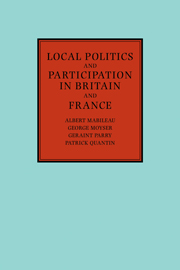Book contents
- Frontmatter
- Contents
- List of figures and tables
- Notes on contributors
- Preface
- PART I SCOPE AND CONTEXT
- PART II PARTICIPATION
- Introduction
- 3 Participation and non-participation in an English town
- 4 Participation and non-participation in a French town
- Conclusion
- PART III POLITICAL MOBILISATION
- PART IV LOCAL ELITES, GROUPS AND CITIZENS
- PART V COMMUNITY OR LOCALITY?
- PART VI CONCLUSIONS
- Bibliography
- Index
4 - Participation and non-participation in a French town
Published online by Cambridge University Press: 04 May 2010
- Frontmatter
- Contents
- List of figures and tables
- Notes on contributors
- Preface
- PART I SCOPE AND CONTEXT
- PART II PARTICIPATION
- Introduction
- 3 Participation and non-participation in an English town
- 4 Participation and non-participation in a French town
- Conclusion
- PART III POLITICAL MOBILISATION
- PART IV LOCAL ELITES, GROUPS AND CITIZENS
- PART V COMMUNITY OR LOCALITY?
- PART VI CONCLUSIONS
- Bibliography
- Index
Summary
THE NATURE OF THE TOWN
This chapter is based on the analysis of data collected using a questionnaire very similar to that employed by the British Political Participation Study in its investigation of a number of British communities. The questionnaire was administered to a representative sample (N = 237) of residents in Mérignac, an urban commune forming part of the metropolitan area of Bordeaux.
This is a commune which today has more than 50,000 inhabitants. Its expansion is relatively recent as, in 1954, its population was only 23,000. This rose to 32,000 in 1962 and to 46,000 in 1968, increases that are mainly due to a movement in the population from the centre of Bordeaux to suburban residential areas. The commune has also taken in a number of new residents who have come from other parts in the département and from elsewhere in France. This explains why the proportion of adult inhabitants who have resided in the commune itself for more than 20 years is now less than half the total.
The breakdown by age of the population of Mérignac is quite close to the average for the nation as a whole. Natural growth is slight, because half the households have no children. Population density is also low, the area covered by the commune being very large; indeed, one of the largest in France. As a result there are only 1,100 inhabitants per square km, compared to the 5,100 we find in Bordeaux itself. A large section of it still consists of pine forests.
- Type
- Chapter
- Information
- Local Politics and Participation in Britain and France , pp. 62 - 81Publisher: Cambridge University PressPrint publication year: 1990



